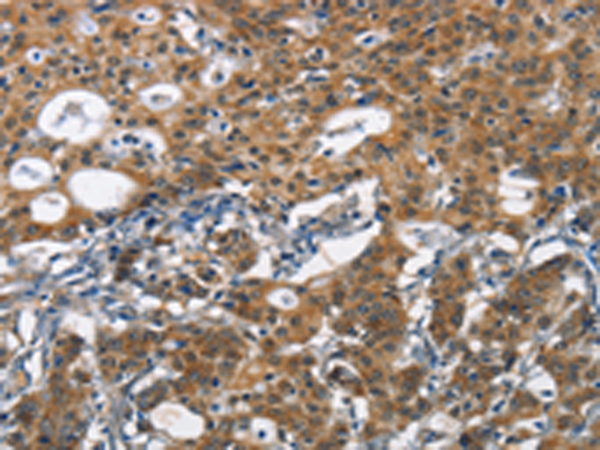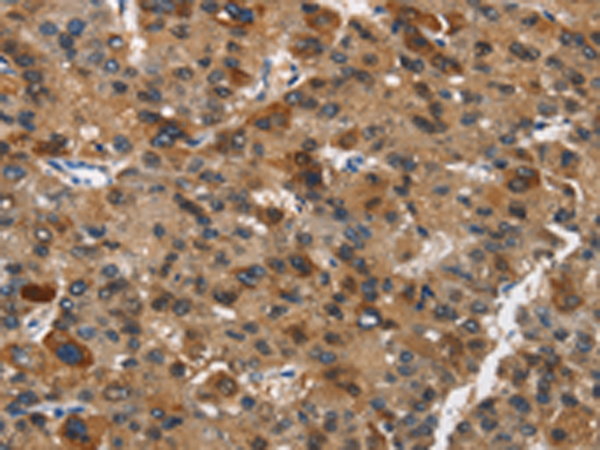

| WB | 咨询技术 | Human,Mouse,Rat |
| IF | 咨询技术 | Human,Mouse,Rat |
| IHC | 咨询技术 | Human,Mouse,Rat |
| ICC | 技术咨询 | Human,Mouse,Rat |
| FCM | 咨询技术 | Human,Mouse,Rat |
| Elisa | 1/20000 | Human,Mouse,Rat |
| Aliases | CRC18; CRCR1; MRMV1; IGDCC1 |
| Host/Isotype | Rabbit IgG |
| Antibody Type | Primary antibody |
| Storage | Store at 4°C short term. Aliquot and store at -20°C long term. Avoid freeze/thaw cycles. |
| Species Reactivity | Human, Mouse, Rat |
| Immunogen | Synthetic peptide of human DCC |
| Formulation | Purified antibody in PBS with 0.05% sodium azide and 50% glycerol. |
+ +
以下是3篇关于IL-21抗体的代表性文献(基于公开研究记忆库整理,具体细节建议核对原文):
1. **文献名称**:*"IL-21 mediates suppressive effects via its dependence on CD4+ T cell-derived IL-21 in murine tumor models"*
**作者**:Herber, D. et al.
**摘要**:该研究通过中和性IL-21抗体在小鼠肿瘤模型中证明,IL-21通过调节CD4+ T细胞功能促进肿瘤免疫抑制,阻断IL-21可显著抑制肿瘤生长并增强抗肿瘤免疫应答。
2. **文献名称**:*"Neutralization of interleukin-21 ameliorates experimental colitis via multiple mechanisms"*
**作者**:Sarra, M. et al.
**摘要**:研究使用IL-21中和抗体治疗小鼠结肠炎模型,发现其能减少肠道炎症细胞浸润并抑制Th17细胞分化,表明IL-21抗体在自身免疫性疾病中的治疗潜力。
3. **文献名称**:*"Therapeutic targeting of IL-21 signaling in inflammatory bowel disease"*
**作者**:Davis, I.D. et al.
**摘要**:临床前研究显示,靶向IL-21的人源化单克隆抗体可通过阻断IL-21/IL-21R通路抑制肠道黏膜T细胞过度活化,初步临床试验证实其安全性及对炎症标志物的改善作用。
4. **文献名称**:*"IL-21 receptor signaling is required for control of chronic viral infection"*
**作者**:Yi, J.S. et al.
**摘要**:通过抗体阻断IL-21信号,发现其削弱了CD8+ T细胞在慢性病毒感染中的持久性功能,提示IL-21抗体可能用于调节过度免疫反应,但也需权衡抗病毒免疫的副作用。
(注:部分文献信息可能存在记忆偏差,建议通过PubMed或学术数据库核对具体标题及作者。)
Interleukin-21 (IL-21) is a pleiotropic cytokine produced primarily by CD4+ T follicular helper cells and natural killer T (NKT) cells. It signals through a heterodimeric receptor composed of the IL-21 receptor (IL-21R) and the common gamma chain (γc), activating JAK-STAT, MAPK, and PI3K pathways. IL-21 plays critical roles in immune regulation, including B cell differentiation, plasma cell survival, cytotoxic T cell activation, and NK cell function. Its dual pro-inflammatory and immunosuppressive effects make it a therapeutic target in autoimmune diseases, cancers, and infections.
IL-21-targeting antibodies are broadly categorized into antagonist antibodies (blocking IL-21/IL-21R interaction) and agonist antibodies (enhancing IL-21 signaling). Antagonist antibodies have shown promise in preclinical models of lupus, rheumatoid arthritis, and inflammatory bowel disease by dampening pathogenic immune responses. Phase I/II trials for autoimmune conditions like lupus are ongoing. Conversely, agonist antibodies designed to boost IL-21's immunostimulatory effects are being explored in cancer immunotherapy, particularly to enhance T and NK cell-mediated tumor clearance.
Challenges include ensuring tissue-specific targeting to avoid systemic toxicity, given IL-21's diverse cellular targets. Combination therapies with checkpoint inhibitors or CAR-T cells are under investigation. Further research focuses on optimizing antibody engineering for improved pharmacokinetics and reduced immunogenicity. The therapeutic potential of IL-21 modulation continues to expand as its complex biology in tumor microenvironments and chronic inflammation becomes better understood.
×